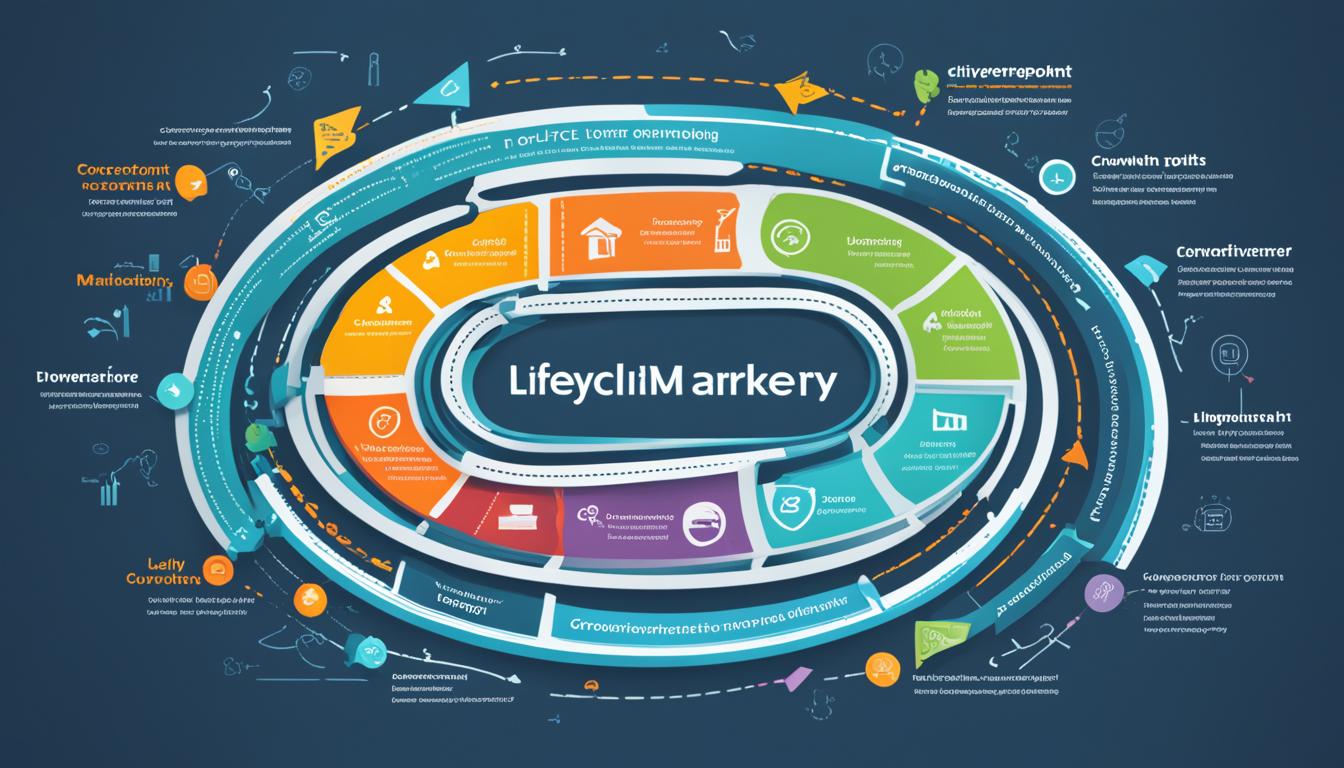Lead generation and affiliate marketing are two essential strategies in the world of digital marketing. Understanding the difference between the two and how they can be combined can help businesses unlock the potential for growth and success. In this comprehensive guide, we will explore what lead generation and affiliate marketing are, their pros and cons, the best strategies and tools for each, and help you determine which approach may be best for your business.
Key Takeaways:
- Lead generation and affiliate marketing are distinct strategies in digital marketing.
- Lead generation focuses on capturing potential customers’ contact information.
- Affiliate marketing involves partnering with affiliates to promote products or services.
- Both strategies have their own advantages and can be combined for maximum results.
- Choosing the right strategies and tools depends on your business goals and target audience.
What is Lead Generation?
Lead generation is the process of attracting potential customers and collecting their contact information to build relationships and motivate them to make a purchase. It involves identifying and targeting individuals who are likely to be interested in a brand’s products or services, and then using various strategies and tactics to capture their contact details.
Lead generation strategies can include:
- Using lead generation software
- Implementing SEO and content marketing techniques
- Outsourcing lead generation to third parties
By utilizing these strategies, businesses can effectively generate leads and nurture them through the sales funnel.
One of the key benefits of lead generation is the ability to reach individuals who have already shown an interest in a product or service, increasing the likelihood of conversion and sales. Additionally, lead generation allows businesses to target their marketing efforts, resulting in more efficient and cost-effective campaigns.
Here are a few lead generation tips to consider:
- Create valuable and informative content to attract potential customers
- Optimize your website and landing pages for search engines
- Offer incentives such as discounts or freebies in exchange for contact information
- Utilize social media platforms to engage and capture leads
By implementing these techniques and staying up to date with the latest lead generation strategies, businesses can effectively generate a steady stream of qualified leads and drive business growth.
What is Affiliate Marketing?
Affiliate marketing is a highly effective and performance-based marketing strategy that involves businesses partnering with affiliates or publishers to promote their products or services. This mutually beneficial arrangement allows affiliates to earn a commission for every sale or action generated through their promotional efforts. Meanwhile, businesses can leverage the existing audiences and networks of their affiliates to reach a wider pool of potential customers.
Affiliate marketing encompasses a variety of tactics and strategies. Some popular affiliate marketing tactics include:
- Social media advertising: Affiliates may utilize platforms like Facebook, Instagram, or Twitter to promote products or services.
- Content marketing: Affiliates create informative and engaging content such as blog posts, reviews, or videos to promote products or services.
- Paid advertising: Affiliates may invest in paid advertising on platforms like Google Ads or Bing Ads to drive traffic and generate sales.
Affiliate marketing offers several advantages for businesses:
- Expanded reach: By partnering with affiliates, businesses can tap into the existing audiences and networks of these affiliates, reaching a broader audience that may not have been accessible otherwise.
- Cost-effective: With affiliate marketing, businesses only pay affiliates when a sale or desired action occurs, making it a cost-effective advertising strategy.
- Targeted marketing: Affiliates are often experts in their niche and have a deep understanding of their audience. This allows businesses to target specific demographics and increase the chances of conversion.
Affiliate Marketing Comparison Table:
| Comparison | Affiliate Marketing | Lead Generation |
|---|---|---|
| Definition | A performance-based marketing strategy where businesses partner with affiliates to promote products or services. | The process of attracting potential customers and collecting their contact information. |
| Main Focus | Promoting and selling products or services through affiliate partnerships. | Identifying and targeting potential customers to generate leads for future marketing efforts. |
| Cost Structure | Pay affiliates a commission for each sale or action generated through their efforts. | Expenses incurred in lead generation efforts such as advertising, content creation, and software/tools. |
| Benefits | Expanded reach, cost-effective, targeted marketing. | Increased sales, targeted marketing, brand awareness. |
As seen in the comparison table above, affiliate marketing and lead generation are distinct strategies with different focuses and objectives. While affiliate marketing aims to leverage affiliates’ promotional efforts and generate sales, lead generation is centered around capturing potential customers’ contact information for future marketing activities.
By carefully considering their business goals, target audience, and available resources, businesses can determine which approach, or a combination of both, will best suit their needs. Some businesses may choose to incorporate elements of both affiliate marketing and lead generation to optimize their marketing efforts and achieve maximum results.
Leadgen Affiliate Marketing Offers
Leadgen affiliate marketing offers are a specific direction within the affiliate marketing world that focuses on generating leads for businesses. These offers typically involve high-priced products or services that require a longer sales process. Affiliate marketers act as intermediaries between the business and potential customers, collecting leads and earning a commission for each lead generated.
Common leadgen affiliate marketing offers include insurance services, real estate offers, and survey offers.
This image highlights the concept of leadgen affiliate marketing offers, showcasing how affiliate marketers can bridge the gap between businesses and potential customers by collecting leads and earning commissions.
Affiliate Marketing vs. Leadgen: Sum it Up
Affiliate marketing and lead generation are two distinct strategies in the digital marketing landscape. While affiliate marketing focuses on promoting and selling products or services through affiliates, lead generation is about attracting potential customers and collecting their contact information. Both strategies have their own advantages and disadvantages, and businesses can choose to incorporate elements of both to maximize their results. It’s important to carefully consider your business goals, target audience, and resources to determine which approach may be more suitable.
Pros and Cons of Lead Generation
Lead generation is an essential strategy for businesses seeking to increase sales, implement targeted marketing campaigns, and enhance brand awareness. By attracting potential customers who have shown interest in their products or services, businesses can achieve higher conversion rates and drive growth. However, it’s important to consider the pros and cons of lead generation to ensure that efforts are effective and yield a positive return on investment.
Benefits of Lead Generation
- Increased Sales: Lead generation allows businesses to connect with potential customers who are already interested in their offerings, resulting in a higher likelihood of making a sale.
- Targeted Marketing: By targeting individuals who have expressed interest in specific products or services, businesses can tailor their marketing efforts to resonate with their audience and improve campaign effectiveness.
- Brand Awareness: Lead generation helps to raise awareness of a business and its offerings among potential customers, enhancing brand recognition and reputation.
Challenges of Lead Generation
- Time-Consuming: Lead generation can be a time-intensive process, requiring ongoing efforts to identify and engage with potential customers.
- Costly: Implementing effective lead generation strategies may involve investments in various tools, software, and marketing channels, which can add up in terms of costs.
- Lead Quality: Not all leads generated through lead generation efforts may be of high quality. It’s crucial for businesses to carefully manage and filter leads to focus on those with the highest potential for conversion.
To maximize the benefits of lead generation, businesses should employ effective lead generation techniques and follow best practices. These can include leveraging data analytics, optimizing landing pages, utilizing targeted content marketing strategies, and implementing efficient lead nurturing processes.
While lead generation can present challenges, businesses that manage and monitor their lead generation efforts effectively can reap the rewards of increased sales, targeted marketing, and brand awareness.
| Pros | Cons |
|---|---|
| Increased sales opportunities | Time-consuming process |
| Targeted marketing campaigns | Costly investments |
| Improved brand awareness | Potential for low-quality leads |
Pros and Cons of Affiliate Marketing
Affiliate marketing offers businesses numerous advantages, making it an attractive strategy for reaching new customers and increasing sales. Here are some key benefits of affiliate marketing:
- Cost-Effective: Affiliate marketing allows businesses to leverage the existing audiences of affiliates, eliminating the need for extensive advertising and marketing budgets.
- Expanded Reach: By partnering with affiliates, businesses can tap into diverse networks and reach a wider pool of potential customers.
- Targeted Promotion: Affiliates are experts at targeting specific audiences, which means businesses can benefit from highly focused marketing efforts.
- Brand Awareness: With affiliates promoting their products or services, businesses can enhance their brand visibility and increase awareness.
However, it’s important to consider the drawbacks of affiliate marketing as well:
- Management Challenges: Affiliates must be closely monitored to ensure they are promoting products in line with the brand and legal requirements.
- Commission Costs: Businesses need to allocate a portion of their revenue as commissions to affiliates, which can impact profitability.
- Limited Control: Since affiliates are independent entities, businesses have limited control over their marketing efforts and tactics.
Despite these challenges, when executed and managed effectively, affiliate marketing can be a powerful tool for businesses to increase their customer base and boost sales.
Best Lead Generation Strategies and Tools
When it comes to lead generation, having a comprehensive strategy in place is crucial for success. By employing a combination of effective tactics and utilizing the right tools, businesses can maximize their lead generation efforts. Here are some of the best lead generation strategies and tools to consider:
1. Content Marketing
Creating valuable and engaging content is an essential lead generation technique. By producing informative blog posts, ebooks, whitepapers, and videos, businesses can attract potential customers and capture their contact information. Content marketing also helps establish credibility and positions a brand as an industry authority.
2. Social Media Advertising
Social media platforms provide a vast audience base and sophisticated targeting options, making them ideal for lead generation. By running targeted ad campaigns on platforms like Facebook, Instagram, and LinkedIn, businesses can reach their target audience and drive them to landing pages or lead capture forms.
3. Email Marketing
Email marketing remains a highly effective lead generation strategy. By building a subscriber list and sending targeted and personalized emails, businesses can nurture leads and guide them through the sales funnel. Email marketing automation tools can streamline the process and enhance email campaign performance.
4. Search Engine Optimization
Optimizing a website for search engines is crucial for generating organic traffic and capturing leads. By conducting keyword research, optimizing on-page elements, and building high-quality backlinks, businesses can improve their website’s visibility and attract potential customers who are actively searching for their products or services.
5. Lead Generation Software
Utilizing lead generation software can greatly enhance lead capture and management efforts. These tools provide features such as lead tracking, lead scoring, and CRM integration, allowing businesses to effectively manage and nurture leads throughout the sales process. Popular lead generation software options include HubSpot, Leadpages, and Salesforce.
6. Landing Page Builders
Landing page builders enable businesses to create visually appealing and conversion-focused landing pages without the need for coding or design skills. These tools offer customizable templates and drag-and-drop functionality, making it easy to create landing pages optimized for lead generation. Examples of landing page builder tools include Unbounce, Instapage, and ConvertKit.
By incorporating these lead generation strategies and utilizing the right tools, businesses can generate high-quality leads and increase their chances of converting them into loyal customers. It is important to tailor the strategies and tools to fit the specific target audience, industry, and budget of the business.
Best Affiliate Marketing Strategies and Tools
Successful affiliate marketing campaigns require careful planning and execution. By implementing effective strategies and utilizing the right tools, businesses can optimize their affiliate marketing efforts and drive better results. Here are some key tactics and tools to consider:
1. Focus on One Platform
Instead of spreading your efforts across multiple platforms, concentrate on one platform that aligns with your target audience. Whether it’s a popular social media platform or a specific affiliate network, narrowing your focus allows you to streamline your campaigns and maximize your impact.
2. Utilize Social Media Advertising
Social media platforms provide a vast opportunity for affiliate marketing. By utilizing targeted advertising options offered by platforms such as Facebook, Instagram, and Twitter, you can effectively reach your desired audience and promote your affiliate offers.
3. Optimize Content for SEO
Applying SEO techniques to your affiliate marketing content can help boost visibility and attract organic traffic. Conduct keyword research, optimize your website and landing pages, and create high-quality content that appeals to both search engines and users.
4. Leverage Affiliate Management Software
Investing in reliable affiliate management software can simplify the process of managing and monitoring your affiliate marketing campaigns. These tools offer features such as tracking, reporting, commission management, and affiliate recruitment, making it easier to track performance and scale your affiliate program.
5. Utilize Tracking Platforms
Tracking platforms allow you to monitor key metrics and analyze the performance of your affiliate marketing campaigns. With accurate data and insights, you can make data-driven decisions and optimize your strategies for better results.

| Strategies | Benefits |
|---|---|
| Focus on One Platform | – Streamlined campaigns – Better audience targeting |
| Utilize Social Media Advertising | – Increased reach – Targeted audience |
| Optimize Content for SEO | – Improved visibility – Organic traffic |
| Leverage Affiliate Management Software | – Easy campaign management – Performance tracking |
| Utilize Tracking Platforms | – Data-driven decision making – Performance analysis |
Implementing these strategies and utilizing the right tools can help businesses drive successful affiliate marketing campaigns. By focusing on one platform, leveraging social media advertising, optimizing content for SEO, utilizing affiliate management software, and utilizing tracking platforms, businesses can maximize their affiliate marketing efforts and achieve their goals.
Combining Lead Generation and Affiliate Marketing
Lead generation and affiliate marketing are two powerful strategies in the world of digital marketing. When combined effectively, businesses can maximize their results and achieve significant growth. By utilizing leadgen affiliate marketing offers, businesses can generate high-quality leads and earn commissions, leveraging the strengths of both strategies.
One of the key advantages of combining lead generation and affiliate marketing is the ability to tap into the existing networks and audiences of affiliates. Affiliate marketers can promote the business’s products or services to their audience, driving traffic and potential leads to the business’s website or landing page.
Careful selection of affiliates is crucial in ensuring the success of this combined approach. Businesses should partner with affiliates who have a relevant target audience and align with their brand values. This helps to ensure that the leads generated are of high quality and have a higher chance of conversion.
Managing relationships with affiliates is also essential. Providing them with the necessary tools, resources, and support can significantly impact their promotional efforts and ultimately lead generation. Regular communication, performance tracking, and commission payments can help businesses maintain strong partnerships with affiliates.
Combining lead generation and affiliate marketing can yield significant benefits for businesses. It allows businesses to reach a wider pool of potential customers, increase brand awareness, and boost sales. By leveraging the strategies and techniques from both approaches, businesses can create a comprehensive marketing strategy that drives sustainable growth.
| Benefits of Combining Lead Generation and Affiliate Marketing | Strategies and Techniques |
|---|---|
| 1. Access to wider audiences through affiliates | 1. Selecting affiliates with relevant target audience |
| 2. Increased brand visibility and awareness | 2. Providing affiliates with necessary tools and resources |
| 3. Higher chances of lead conversion | 3. Regular communication and performance tracking |
| 4. Opportunity to earn commissions from lead generation | 4. Managing commission payments and incentives |
Conclusion
Lead generation and affiliate marketing are two powerful strategies that businesses can leverage in the digital marketing landscape. By understanding the difference between the two and how they can be combined, businesses can make informed decisions and develop effective marketing strategies to drive growth and success.
Lead generation offers several benefits, including increased sales, targeted marketing, and brand awareness. It allows businesses to attract potential customers who have shown interest in their products or services, resulting in higher conversion rates and valuable relationships. On the other hand, affiliate marketing enables businesses to tap into the existing audiences and networks of affiliates to reach a wider pool of potential customers. This strategy can lead to increased sales, customer acquisition, and brand exposure.
To maximize results, businesses can combine the strengths of lead generation and affiliate marketing. By incorporating leadgen affiliate marketing offers, businesses can generate high-quality leads while earning commissions. This approach leverages the power of affiliate marketing tactics and lead generation techniques to drive sales and build fruitful relationships with customers.
Overall, both lead generation and affiliate marketing have their own advantages and can contribute significantly to a business’s growth. When used strategically and in accordance with the specific business goals, these strategies offer immense potential for increased sales, brand awareness, and customer acquisition.
FAQ
What is lead generation?
Lead generation is the process of attracting potential customers and collecting their contact information to build relationships and motivate them to make a purchase.
What is affiliate marketing?
Affiliate marketing is a performance-based marketing strategy where a business partners with affiliates to promote their products or services and affiliates earn a commission for every sale or action generated through their efforts.
What are leadgen affiliate marketing offers?
Leadgen affiliate marketing offers are a specific direction within affiliate marketing that focuses on generating leads for businesses by collecting contact information from potential customers.
How do lead generation and affiliate marketing differ?
Lead generation focuses on attracting potential customers and collecting their contact information, while affiliate marketing focuses on promoting and selling products or services through affiliates.
What are the pros and cons of lead generation?
The pros of lead generation include increased sales, targeted marketing, and brand awareness, but it can be time-consuming and costly and not all leads may be of high quality.
What are the pros and cons of affiliate marketing?
The pros of affiliate marketing include reaching new customers and increasing sales, but it requires careful management, commission costs, and lack of control over marketing efforts.
What are the best lead generation strategies and tools?
Effective lead generation strategies involve tactics such as content marketing, social media advertising, email marketing, and SEO. Tools like lead generation software and landing page builders can also enhance efforts.
What are the best affiliate marketing strategies and tools?
Successful affiliate marketing campaigns involve strategies like focusing on one platform, utilizing social media advertising, and optimizing content for SEO. Tools like affiliate management software and tracking platforms can be helpful.
How can lead generation and affiliate marketing be combined?
Lead generation and affiliate marketing can be combined by utilizing leadgen affiliate marketing offers to generate leads and earn commissions, leveraging the strengths of both strategies.
What are the benefits of combining lead generation and affiliate marketing?
Combining lead generation and affiliate marketing allows businesses to generate high-quality leads, increase sales, and reach a wider pool of potential customers.
How can lead generation and affiliate marketing help businesses grow?
Lead generation and affiliate marketing are powerful strategies that can help businesses grow by increasing sales, boosting brand awareness, and acquiring new customers.



